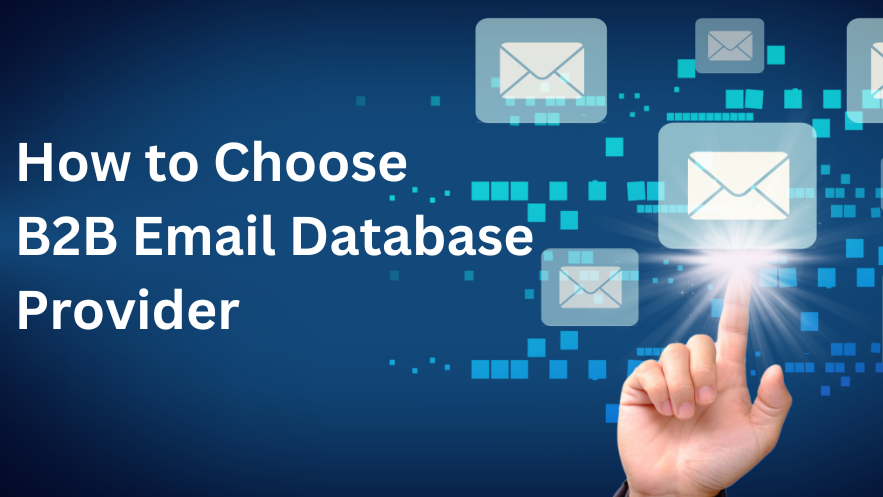In the fast-paced world of B2B marketing, having access to a reliable and targeted email database can make all the difference between a successful campaign and wasted resources. A high-quality B2B email database enables businesses to reach decision-makers, generate leads, and convert prospects into customers. However, choosing the right email database provider is not a decision to be taken lightly. This guide will walk you through the key factors to consider when selecting the best B2B email database provider for your business needs.
1. Assess Your Business Requirements
Before diving into the pool of providers, it is essential to outline your business needs clearly. Consider the following questions:
Target Audience: Who are your ideal customers? What industries, job titles, or geographic locations do you want to target?
Database Size: How large of an email database do you require?
Budget: What is your budget for purchasing or subscribing to an email database?
Campaign Goals: Are you focusing on lead generation, nurturing, or account-based marketing (ABM)?
Understanding your objectives and constraints will help narrow down your choices and ensure that you select a provider that aligns with your goals.
2. Look for Data Accuracy and Quality
The accuracy and quality of the data are non-negotiable when choosing a B2B email database provider. Outdated or incorrect information can lead to undeliverable emails, lower engagement rates, and damage to your sender reputation. Evaluate the provider based on the following criteria:
Verification Processes: Ensure the provider uses advanced data verification techniques, such as AI tools and manual checks, to maintain accuracy.
Source of Data: Inquire about how the data is collected. Reliable providers gather data from legitimate sources like public records, opt-in subscriptions, and reputable partnerships.
Update Frequency: The provider should regularly update the database to remove outdated entries and add new ones.
Request sample data from the provider and test it for accuracy before committing to a purchase.
3. Compliance with Data Privacy Regulations
With stringent data protection regulations like GDPR, CAN-SPAM, and CCPA in place, compliance is critical when choosing a B2B email database provider. Using non-compliant data can result in hefty fines and reputational damage.
Opt-In Data: Ensure the provider collects data ethically and has proper consent from the individuals listed in the database.
Certification: Check if the provider complies with relevant data protection laws and has certifications to prove it.
Documentation: Ask for proof of compliance, such as data processing agreements or privacy policy documents.
A provider that prioritizes data privacy and compliance ensures your marketing campaigns are both ethical and effective.
4. Customization and Segmentation Options
Every business has unique needs, and a one-size-fits-all database may not meet your requirements. Look for a provider that offers:
Customizable Lists: The ability to tailor the database based on your target demographics, such as industry, company size, job role, or geographic location.
Segmentation Features: Options to segment the data for more targeted campaigns, which can lead to higher engagement and conversion rates.
A provider that offers detailed customization ensures you can fine-tune your campaigns for maximum impact.
5. Check for Industry-Specific Expertise
Some providers specialize in specific industries or niches, such as healthcare, technology, or finance. If your business operates in a specialized sector, working with a provider that understands your industry can be advantageous.
Industry Relevance: Verify that the provider has expertise in your target industry.
Relevant Case Studies: Request case studies or testimonials from clients in your industry to gauge the provider’s performance.
Choosing a provider with industry-specific expertise can result in a more relevant and effective database.
6. Evaluate Customer Support
Strong customer support can make a significant difference when dealing with technical issues, database updates, or customization requests. Assess the provider’s support capabilities by considering:
Availability: Does the provider offer 24/7 customer support?
Support Channels: Are there multiple ways to contact the provider, such as email, phone, or live chat?
Response Time: How quickly does the support team respond to queries?
Reliable customer support ensures smooth operations and timely resolution of any issues that may arise.
7. Compare Pricing and ROI
Price is an important factor, but it shouldn’t be the sole determinant. A cheaper database may lack quality, while an expensive one might offer features you don’t need. To make an informed decision:
Request Quotes: Obtain pricing details from multiple providers for comparison.
Understand the Cost Structure: Determine if the provider charges a one-time fee, subscription, or pay-per-lead model.
Calculate ROI: Consider the potential return on investment (ROI) based on the quality and usability of the database.
A balanced approach that considers both cost and value will help you maximize your investment.
8. Review Client Testimonials and Case Studies
Reputation matters when selecting a B2B email database provider. Research the provider’s track record by:
Reading Testimonials: Look for positive feedback from past clients on the provider’s website or third-party review platforms.
Analyzing Case Studies: Examine case studies to understand how the provider has helped other businesses achieve their marketing goals.
Seeking Referrals: Ask for references from the provider and reach out to their existing clients for honest feedback.
A well-regarded provider with a history of satisfied clients is more likely to meet your expectations.
9. Test Before You Commit
Many providers offer free trials or sample data to help potential customers evaluate their services. Take advantage of these offers to:
Verify Data Quality: Test the sample data for accuracy, relevance, and deliverability.
Assess Usability: Determine whether the database is easy to navigate and integrate with your existing tools, such as CRMs or email marketing platforms.
Testing a provider’s offerings firsthand can help you make a confident decision.
10. Consider Scalability and Future Needs
Your business’s needs may evolve over time, so it’s important to choose a provider that can scale with you. Evaluate:
Database Expansion: Does the provider offer the flexibility to expand the database as your business grows?
Integration Capabilities: Can the database be easily integrated with other tools or systems you may adopt in the future?
Long-Term Contracts: Avoid locking into long-term contracts unless you are confident about the provider’s ability to meet your evolving needs.
A scalable solution ensures your database remains relevant and valuable as your business grows.
Conclusion
Selecting the best B2B email database provider is a crucial step in driving successful marketing campaigns. By considering factors such as data accuracy, compliance, customization, industry expertise, and customer support, you can find a provider that aligns with your business goals and delivers measurable results.
Remember, a high-quality email database is an investment in your business’s growth. Take the time to research and choose a provider that prioritizes data quality, adheres to privacy regulations, and offers scalable solutions. With the right database in hand, your marketing efforts are bound to thrive.



